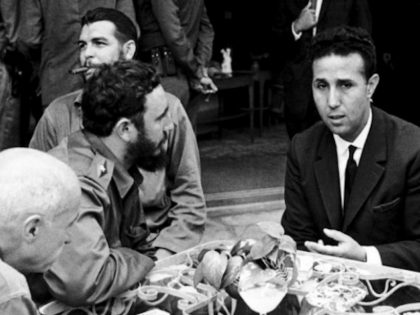What’s in an apology
President Emmanuel Macron's apology to Algerians over French colonialism us about presidential elections in France.

Screen grab of an interview with President Emmanuel Macron of France.
In a recent interview on a private Algerian TV news station, French presidential candidate Emmanuel Macron called France’s colonial history an act of barbarism and a crime against humanity; if elected head of state, he would issue an official apology to all victims of colonialism. With this condemnation and promise – coming already more than half a century after the independence movements that marked the end of the old colonial project – Macron, the leader and founder of the progressive En Marche! party and current front-runner in what has proven a turbulent race, has rekindled a divisive debate in France ahead of the first round of voting on April 23.
Polling suggests that the country is almost evenly split in its opinion of colonialism (those who agree with Macron have a very slight edge over those who disagree). From across the political spectrum his comments have elicited strong reactions, although, predictably, the sharpest criticism has come from the right.
Marine Le Pen — Macron’s main competitor and candidate for the right-wing Front National and for whom colonialism rather perversely represents the positive sharing of French values — responded by accusing him of disloyalty to France. Le Pen’s response is in keeping with the nationalist rhetoric that she has used to great effect throughout her political career and especially during this presidential race, which has come in the wake of a series of extremist attacks in the country. Indeed, her reaction reveals a disturbing tendency in France: because of the history of atrocities committed by the French government and its citizens, the strong tradition of French Republican pride, which rests on equality and universal human rights, requires a second, twin tradition of amnesia and revisionism in order for it to appear unsullied. One might recall that former president François Mitterrand maintained that he would “not apologize in the name of France” for Vichy’s complicity with the Nazi government. It was Jacques Chirac who issued a full apology in 1995, half a century after the Holocaust.
In Algeria, Macron’s condemnation of colonial violence was met with approval by several public figures and political leaders. Algerian politicians, for whom such a statement is long overdue, are largely bitter about the issue of an apology for colonialism: for the French government to choose not to recognize the torture, rape, killing, seizure of property, and assault on dignity suffered by Algerians at its hands amounts to arrogance and callousness. Admitting that these atrocities were committed under colonialism and during the Algerian struggle for independence, would bring necessary closure.
Despite the two clear, opposed stances on colonialism that Macron’s comments appear to have dusted off and presented anew, the relationship between Algeria and France is both antagonistic and intimate, the site of quite a few knots and gray areas. For instance, although France began its nuclear tests at the time of the Algerian War of Independence in the colony’s desert south, it was the Algerian independence movement and current ruling party, the Front de Libération Nationale, that later allowed the bulk of French nuclear testing to continue after independence by granting the French government access to the Sahara during the annexes secrètes of the Evian Accords — hence the FLN government’s silence regarding the thousands that suffer from the released radiation to this day.
A history of cooperation between the governments of both countries makes the potential consequences of Macron’s would-be apology difficult to disentangle. Already, without an apology, the two countries have a strong symbiotic trade relationship — though China has come to surpass France as Algeria’s primary trading partner. And as Macron mentions in the interview, as it is, both countries cooperate heavily on counterterrorism efforts.
Of course, this is not to discount the symbolism of an apology. To be sure, France is not the only country to glaze over its brutal colonial past; if Macron were to be elected and issue an official apology to France’s former colonies, it could set a precedent for other European states and pave the way for reparations. Such an apology might also serve to humble those who are quick to promote the French self-image of liberté, égalité, fraternité, doubtless a noble credo, but one that is often mobilized along the fault lines of the old colonial imagination to distinguish a just France from its corrupt and unstable former colonies. However, in an already divisive political climate exacerbated by Islamophobia, in light of the recent attacks in France, such an apology could also lead to further entrenchment into progressive and nationalist camps. Nevertheless, for French citizens of Algerian or other African descent, an admission of the destructive nature of colonialism would amount to an initial recognition by the French state of the phenomenon that underpins the structural racism they encounter in their daily lives.
However, Macron’s comments also invite former French colonies to consider their own national memories. In Algeria especially, there is a certain paradox in the fact that national identity has been so strongly constructed in opposition to the colonial power that delineated it as a coherent territory. In some sense, Algeria, the “country of a million martyrs,” has depended on the image of a colonial France in order to create a unified national memory across its vast geographic and cultural expanse; this is especially true of the FLN, whose legitimacy is bound up in the struggle for independence against the French. Of course, an apology would be welcomed by the Algerian government, but an unresolved debate with France on the effects of French colonialism has been able to serve as an end in itself.



